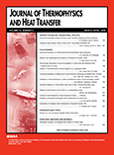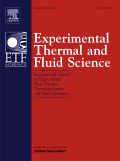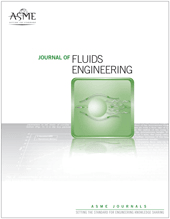
Propulsion and Power Research
Scope & Guideline
Pioneering Research for Tomorrow's Propulsion Systems.
Introduction
Aims and Scopes
- Fluid Dynamics and Heat Transfer:
Research on fluid flow characteristics, heat transfer mechanisms, and thermal management systems, particularly in the context of propulsion systems and power generation. - Nanofluids and Advanced Materials:
Investigation into the properties and applications of nanofluids and other advanced materials to improve thermal performance, combustion characteristics, and overall efficiency in engineering systems. - Numerical Simulations and Computational Fluid Dynamics (CFD):
Utilization of numerical methods, including CFD simulations, to predict and analyze the behavior of complex fluid flows and thermal phenomena in propulsion and power systems. - Energy Optimization and Exergy Analysis:
Focus on optimizing energy use and analyzing exergy in various systems to enhance performance and reduce environmental impact. - Innovative Propulsion Systems:
Exploration of novel propulsion technologies, including hybrid systems, ion propulsion, and scramjet engines, to advance aerospace and automotive applications. - Magnetohydrodynamics (MHD):
Research on the behavior of electrically conducting fluids in magnetic fields, with applications in propulsion and energy generation. - Thermal Management Systems:
Development of advanced cooling and thermal management strategies for high-performance engines and power systems to ensure reliability and efficiency.
Trending and Emerging
- Deep Learning and AI in Fluid Dynamics:
The application of deep learning and artificial intelligence techniques for predictive modeling and optimization in fluid dynamics is increasingly prominent, indicating a shift towards data-driven research. - Hybrid Propulsion Systems:
Research on hybrid propulsion systems, combining various technologies such as electric and conventional engines, is on the rise, driven by the need for more sustainable and efficient solutions. - Magnetohydrodynamics (MHD) Applications:
The exploration of MHD phenomena in propulsion and energy systems continues to gain attention, particularly in the context of advanced cooling and energy generation technologies. - Nanofluid Applications in Thermal Systems:
There is a growing interest in the use of nanofluids for enhanced thermal performance across various applications, reflecting the trend towards advanced materials in engineering. - High-Performance Turbomachinery:
Research focusing on the design, optimization, and performance of high-efficiency turbomachinery is trending, as industries seek to improve energy conversion efficiencies. - Sustainable and Alternative Fuels:
The shift towards sustainable and alternative fuels in propulsion systems is increasingly significant, with research addressing the challenges and opportunities these fuels present. - Complex Flow Dynamics in Aerospace Applications:
Emerging studies on complex flow dynamics, including vortex dynamics and thermal management in aerospace applications, signify a trend towards more sophisticated analyses.
Declining or Waning
- Traditional Combustion Processes:
Research related to conventional combustion processes has decreased, possibly due to the growing interest in alternative fuels and advanced combustion technologies. - Low-Temperature Heat Exchangers:
Studies focused on low-temperature heat exchanger technologies have waned, as researchers shift towards high-efficiency systems and novel materials. - Static Aeroelasticity Studies:
The focus on static aeroelasticity in propulsion systems has diminished, with fewer publications addressing the traditional aerodynamic interactions in favor of more dynamic and complex analyses. - Basic Fluid Mechanics Principles:
Research centered on fundamental fluid mechanics principles appears to be declining, as the journal increasingly emphasizes advanced applications and computational methods. - Simplistic Thermodynamic Models:
The use of simplistic or classical thermodynamic models is less common, reflecting a trend towards more complex and realistic modeling approaches.
Similar Journals

Computational Thermal Sciences
Illuminating the Future of Thermal SciencesComputational Thermal Sciences, an esteemed journal published by BEGELL HOUSE INC, presents cutting-edge research at the intersection of computational mathematics, energy engineering, and fluid dynamics. With an ISSN of 1940-2503 and an E-ISSN of 1940-2554, this journal aims to disseminate high-quality research articles, reviews, and methodologies that improve our understanding of thermal processes and their applications. Renowned for its solid impact in the field, it holds a Q3 ranking in multiple categories including Computational Mathematics and Energy Engineering for 2023. As the field evolves, the journal continues to play a pivotal role in bridging theoretical research with practical innovations, thereby catering to a diverse audience of researchers, professionals, and students. Although it operates on a subscription model, the journal ensures accessibility to significant contributions in thermal sciences from 2009 to 2024, fostering an environment of knowledge sharing and collaboration.

JOURNAL OF THERMOPHYSICS AND HEAT TRANSFER
Illuminating the Path of Thermophysical DiscoveriesJOURNAL OF THERMOPHYSICS AND HEAT TRANSFER, published by the American Institute of Aeronautics and Astronautics, serves as a vital platform for the dissemination of cutting-edge research in the fields of thermophysics and heat transfer. With an ISSN of 0887-8722 and an E-ISSN of 1533-6808, this journal has been pivotal in enhancing our understanding of heat transfer mechanisms since its inception in 1987, continuing through 2024. It occupies a noteworthy position in various academic categories, boasting Q2 rankings in both Fluid Flow and Transfer Processes and Mechanical Engineering, reflecting its significant contribution to the engineering and physical sciences community. Although it currently does not offer Open Access options, the journal’s repository of rigorous peer-reviewed articles remains accessible to researchers, professionals, and students eager to expand their knowledge and apply innovative findings in aerospace, condensed matter physics, and planetary sciences. Emphasizing both theoretical and experimental approaches, the JOURNAL OF THERMOPHYSICS AND HEAT TRANSFER remains an indispensable resource for advancing the frontiers of engineering and applied sciences.

FDMP-Fluid Dynamics & Materials Processing
Transforming Insights into Innovations in Materials ScienceFDMP-Fluid Dynamics & Materials Processing, published by TECH SCIENCE PRESS, stands as a significant contribution to the field of materials science, specifically focusing on the intricate relationships between fluid dynamics and material processing. With an ISSN of 1555-256X and an E-ISSN of 1555-2578, this journal offers an open-access platform where researchers can disseminate their work broadly, promoting collaboration and innovation among professionals and students alike. Established in 2007 and continuously evolving through to 2024, the journal is classified in the Q4 category of materials science, ranking at #347 out of 463 in the Scopus database, signifying its niche yet crucial role in the academic community. By focusing on the dynamic interplay between fluid behavior and material properties, FDMP addresses contemporary challenges and advances in material processing techniques. The journal plays a pivotal role for academics and industry professionals seeking to push the boundaries of knowledge and application in materials science.

JOURNAL OF ENGINEERING PHYSICS AND THERMOPHYSICS
Fostering Innovation in Condensed Matter and Engineering DisciplinesJOURNAL OF ENGINEERING PHYSICS AND THERMOPHYSICS, published by Springer, is a vital resource for researchers and professionals in the fields of engineering physics and thermophysics. With an ISSN of 1062-0125 and an E-ISSN of 1573-871X, this esteemed journal has been disseminating high-quality research since its inception, covering critical advancements in both condensed matter physics and various engineering disciplines. Despite its classification within the third quartile in both Scopus categories for 2023, the journal remains a significant conduit for innovative studies that push the boundaries of knowledge in thermal and physical engineering, with converged years spanning from 1992 to 1997 and 2004 to 2024. The journal does not offer open access, which means subscribers and institutions have exclusive access to its rich content. As the field continues to evolve, JOURNAL OF ENGINEERING PHYSICS AND THERMOPHYSICS plays an essential role in fostering scholarly discussions and supporting the academic community in tackling contemporary engineering challenges.

Heat Transfer
Unlocking the secrets of heat transfer for enhanced performance.Heat Transfer, published by WILEY, is a leading open-access journal dedicated to advancing the field of heat transfer science, encompassing innovative research and application across various domains. With an ISSN of 2688-4534 and an E-ISSN of 2688-4542, the journal aims to provide a platform for researchers to disseminate their findings from 2020 to 2024, focusing on condensed matter physics and fluid dynamics. Ranked in the Q2 category for both Condensed Matter Physics and Fluid Flow and Transfer Processes, it showcases articles that contribute significantly to the understanding and utilization of heat transfer mechanisms. Located in the United States at 111 River St, Hoboken, NJ 07030, the journal appeals to a diverse audience, including academic researchers, professionals in engineering, and students seeking to deepen their knowledge in thermal sciences. With a strong emphasis on accessibility, Heat Transfer promotes the exchange of ideas and experimental techniques, ultimately driving innovation and collaboration in the advancement of thermal management technologies.

THERMAL ENGINEERING
Exploring Innovations in Thermal Processes and TechnologiesTHERMAL ENGINEERING is a premier journal dedicated to advancing the field of thermal engineering, with particular importance in the domains of Energy Engineering, Nuclear Energy, and Power Technology. Published by PLEIADES PUBLISHING INC, this esteemed journal has been providing significant scholarly contributions since its inception, with its converged years spanning from 1970 to 2024. Though currently non-open access, the journal presents a unique avenue for researchers, professionals, and students to explore groundbreaking research and innovative solutions related to energy systems and thermal processes. With a notable impact factor and positioned in the Q3 quartile for both Energy Engineering and Nuclear Energy, THERMAL ENGINEERING ensures the dissemination of high-quality research with a global reach, making it an essential resource for those looking to stay at the forefront of essential energy technologies and engineering advancements.

INTERNATIONAL JOURNAL OF HEAT AND FLUID FLOW
Advancing the Frontiers of Heat and Fluid DynamicsFounded in 1979, the INTERNATIONAL JOURNAL OF HEAT AND FLUID FLOW is a premier publication in the fields of mechanical engineering, fluid dynamics, and heat transfer, published by Elsevier Science Inc. With an impressive impact factor and ranking in the Q1 category for Mechanical Engineering and Q2 for Condensed Matter Physics and Fluid Flow and Transfer Processes, this journal is highly regarded for its rigorous peer-reviewed articles that contribute significantly to the advancement of knowledge in these critical areas. Researchers, professionals, and students can access cutting-edge studies that explore the intricacies of thermal and fluid systems, ensuring they stay at the forefront of scientific exploration. The Scopus rankings further affirm its role as a leading source of impactful research, with significant placements in crucial academic categories. Join an active community of scholars committed to innovation and excellence in the exploration of heat and fluid flow phenomena.

JOURNAL OF ENHANCED HEAT TRANSFER
Exploring the Dynamics of Enhanced Heat TransferThe JOURNAL OF ENHANCED HEAT TRANSFER, published by BEGELL HOUSE INC, is a prominent resource for researchers and professionals in the fields of mechanical engineering, fluid flow and transfer processes, and condensed matter physics. With a history spanning from 1993 to 2024, this journal offers a platform for disseminating cutting-edge research and innovations that enhance our understanding of heat transfer phenomena. Although it operates under a traditional subscription model, its impressive standing is underscored by its Scopus rankings—positioned within the 59th percentile for Mechanical Engineering and 58th percentile for Fluid Flow and Transfer Processes. Additionally, it holds Q2 and Q3 categorizations in relevant fields, reflecting its importance in advancing knowledge and applications in heat transfer technology. This journal effectively bridges the gap between theoretical insights and practical solutions, making it an indispensable tool for academics, industrial practitioners, and students eager to explore advancements in thermal management and efficiency.

EXPERIMENTAL THERMAL AND FLUID SCIENCE
Pioneering discoveries in thermal and fluid engineering.EXPERIMENTAL THERMAL AND FLUID SCIENCE is a prestigious academic journal published by Elsevier Science Inc, dedicated to advancing the fields of thermal and fluid sciences. With a strong focus on innovative experimental research, it plays a crucial role in disseminating new knowledge and techniques across multiple domains, including Aerospace Engineering, Chemical Engineering, Fluid Flow and Transfer Processes, Mechanical Engineering, and Nuclear Engineering. Holding a notable impact factor and ranking in the Q1 quartile across these categories since 2023, the journal is recognized for its high-quality contributions, which appeal to a diverse audience of researchers, industry professionals, and students alike. Additionally, with dedicated coverage from its inception in 1988 to projections extending through 2025, EXPERIMENTAL THERMAL AND FLUID SCIENCE provides a vital platform for sharing advancements in experimental techniques and findings that shape the future of engineering and applied sciences.

JOURNAL OF FLUIDS ENGINEERING-TRANSACTIONS OF THE ASME
Unveiling Insights in Thermal and HydrodynamicsJOURNAL OF FLUIDS ENGINEERING-TRANSACTIONS OF THE ASME, published by the renowned American Society of Mechanical Engineers (ASME), stands as a pivotal platform for disseminating cutting-edge research in the field of mechanical engineering, specifically focusing on fluid mechanics and its diverse applications. With an established history dating back to 1897, this journal features research that pushes the boundaries of knowledge and technology in areas such as fluid dynamics, thermal engineering, and hydrodynamics. Although it is not an open-access journal, it maintains rigorous peer-review standards, ensuring the publication of high-quality scholarly articles that contribute to the academic and professional community. In the latest rankings, it holds a respectable position within the Q2 category of mechanical engineering journals, reflecting its significant impact, as evidenced by its Scopus rank of #204 out of 672, placing it in the 69th percentile. Researchers, professionals, and students alike will find this journal to be a vital resource for the latest developments and innovative insights in fluids engineering.